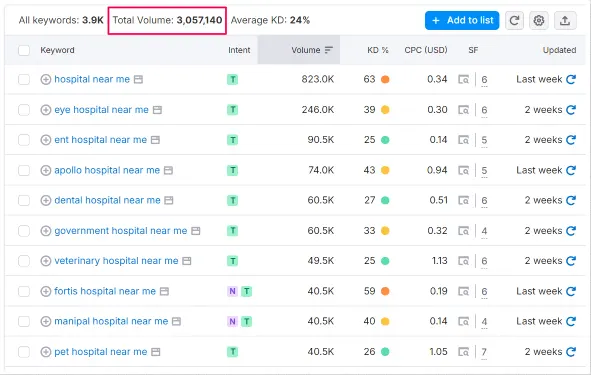
If you’ve just been given the task of handling SEO for a healthcare brand and are feeling a bit lost, don’t worry. This guide will walk you through everything you need to know to boost the online presence of healthcare businesses, specifically in the context of Ahmedabad and Gujarat.
Healthcare SEO is slightly different from your regular SEO strategies, mainly because of the sensitive nature of healthcare services and the extra emphasis on trust and authority. But don’t worry, we’ll break it all down step by step. Let’s dive in!
Table of contents
- What is Healthcare SEO?
- Why is Healthcare SEO Important?
- SEO Strategies for Healthcare Brands
- Conclusion
- Frequently Asked Questions
What is Healthcare SEO?
Simply put, Healthcare SEO is the process of optimising a healthcare website so it appears at the top of search engine results when potential patients search for medical-related services, treatments or information. Whether it’s a hospital, clinic or a doctor’s practice, ranking higher on search results helps these healthcare providers reach more patients and build trust within their community.
Healthcare SEO is about making sure the content you create and the strategies you use are fully aligned with what patients need and trust. Patients are not just customers—they are people seeking urgent and critical services. Your SEO must communicate trust, expertise and authority.
Why is Healthcare SEO Important?
SEO is crucial for healthcare brands because it directly connects people in need with services that can help them. That’s why these healthcare brands usually partner with a healthcare digital marketing agency to drive online traffic and let the users reach them.
Just look at the total search volume for hospital-related queries

Moreover, people who are new in the city might rely on Google to find a hospital or clinic. They might check reviews and then visit the place.
Plus, the younger generation is Internet savvy. Let’s say someone in their family has some issue and wants to see a doctor. They might search it online and recommend that person to visit the hospital as the reviews are really good.
We want to cater to them and that’s why healthcare SEO is important.
SEO Strategies for Healthcare Brands
Before you jump into the strategy, try to understand the services of your clients first like what are the common illnesses, what treatments they provide and why, how is your client’s services different etc.
In fact that’s what we do at our SEO agency.
Let’s understand SEO strategies for healthcare.
1. Target High-Intent and Long-Tail Keywords
Basic keyword research won’t cut it when you’re working with healthcare SEO. You need to go deeper. Use tools like Semrush, Ahrefs or Moz to identify high-intent keywords—those that potential patients are searching for when they’re close to making a decision.
For healthcare, long-tail keywords such as “orthopaedic surgeon for knee pain in Ahmedabad” or “best fertility clinic near Navrangpura” are more likely to convert than just “orthopaedic surgeon.”
Also, focus on search intent categories like:
- Navigational (e.g., “Apollo Hospital Ahmedabad location”)
- Transactional (e.g., “book appointment with skin specialist”)
- Informational (e.g., “symptoms of dengue fever”)
Use Google’s People Also Ask feature and related searches at the bottom of SERPs to find hidden gems. You can even dive into forums like Quora or health-related sites like WebMD to uncover more nuanced queries people are searching for but are underserved by your competitors.
2. Keep Your Content Strategy Authority-Driven and User-Focused
For healthcare SEO, your content strategy must focus on E-E-A-T (Expertise, Authoritativeness, Trustworthiness). Google heavily weighs this in healthcare, as it’s part of the Your Money or Your Life (YMYL) sector.
You can create pillar content and clusters. Develop a pillar page that covers a broad topic like “Everything You Need to Know About Diabetes Care in Ahmedabad.” Then, create cluster content around subtopics such as “Symptoms of Diabetes,” “Best Diet Plans for Diabetics,” and “Top Diabetes Doctors in Gujarat.”
This approach not only strengthens topical relevance but also helps you internally link pages, improving user experience and search engine crawlability.
3. Optimise Google Business Profile
In healthcare, local SEO is everything. Potential patients are looking for nearby clinics, specialists and hospitals. Start by fully optimising your Google My Business Profile.
Keep the N.A.P. (Name, Address, Phone) details consistent not just on your website but across all directories, including local healthcare directories like Practo, Lybrate and Justdial. Because inaccuracies can negatively affect your local SEO.
And regularly update your Google Business Profile with new services, offers or even health tips. These posts show up in search results, giving you an edge in visibility.
4. Build High-Quality, Relevant Backlinks
Healthcare SEO demands high-authority backlinks from reputable sources to build trust with both users and Google.
The key is relevance and trustworthiness. Unlike other industries, you can’t just get backlinks from any random blog. Here’s what you need to focus on:
- Authoritative Healthcare Websites: Reach out to industry leaders or government healthcare sites for backlinks. Guest posts or collaborations with top hospitals or medical journals are gold for healthcare SEO.
- Local News Features: Work with local journalists in Ahmedabad to feature your healthcare brand in stories about medical breakthroughs, community events or partnerships. These can lead to strong backlinks from local news outlets.
5. Mobile SEO and User Experience
Most professionals just think that mobile optimisation is all about keeping the design dynamic. But it’s much more. You need to ensure the entire user experience on mobile is seamless:
- Ensure that patients can quickly book appointments or find information about doctors with just a few taps. Use simple, short forms and enable autofill features.
- Focus on Google’s Core Web Vitals—LCP (Largest Contentful Paint), FID (First Input Delay) and CLS (Cumulative Layout Shift). These directly affect how your website performs in mobile search results.
- Use Google PageSpeed Insights or Lighthouse to regularly audit and improve your mobile experience.
Conclusion
With the right strategy and understanding, you can definitely crack SEO for healthcare brands. Follow the strategies mentioned in this blog to improve your SEO efforts for healthcare brands.
You need to be methodical and precise and build authority in a way that reassures both Google and potential patients. From advanced keyword research and local SEO to structured data and trust-building content, healthcare SEO is all about crafting a patient-first digital experience that translates into real-world trust and business.
Cheers!



